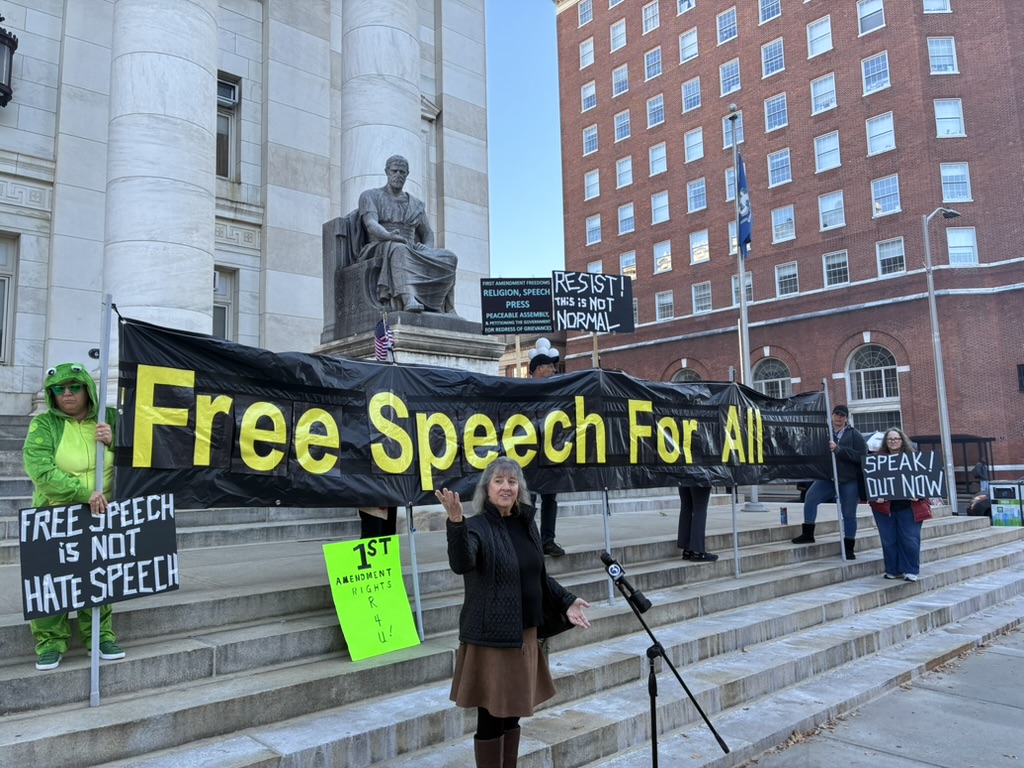Charges dismissed against anti-Trump overpass protester
The state attorney reached an agreement with Katherine Hinds’ lawyers to drop the criminal charges. Protesters gathered outside the courthouse Monday to support her.

Adele Haeg, Contributing Photographer
A Connecticut state attorney formally agreed Monday morning to dismiss criminal charges against a Hamden resident related to highway overpass protests against President Donald Trump.
At a scheduled hearing, the court confirmed a motion by State Attorney David Strollo for the state to voluntarily decline to continue prosecuting Katherine Hinds, according to her attorney Chris Mattei. The two parties formalized the agreement on Monday morning in front of a judge after successfully concluding a series of negotiations.
“We’re here because we’re protecting our rights that are written in the Constitution and we have a right to free speech. Without free speech, we’re nothing,” Hinds said to a crowd assembled outside the New Haven Superior Court after her hearing.
Hinds heads a local chapter of the Connecticut Visibility Brigade, a group that has been protesting against Trump administration policies on highway overpasses since he was reelected.
“This is good news for First Amendment rights,” Dana Glazer, a leader of the national Visibility Brigade, said of Hinds’ case.
Hinds was arrested twice over the summer and charged with second-degree criminal trespassing, second-degree breach of peace and display of unauthorized signs over Interstate 95 while protesting with Brigade members.
Mattei said Hinds’ arrest warrants contained “omissions and inaccuracies” that compromised the state’s case against her.
The dismissal of the case was a “recognition that the type of conduct she was arrested for is protected,” Mattei said.
He told the court there were two key takeaways from Hinds’ case: there should be no affixing of signs to highway overpasses, and that civilians require permits to display certain signage, though not the type Hinds was displaying.
Strollo told the court there were “misunderstandings on both sides” that led to the case on matters of law enforcement that have since been clarified.

The Department of Emergency Services and Public Protection, or the DESPP, and the Connecticut State Police circulated a training bulletin in September that outlined new guidance for police on how to address overpass protests.
According to that bulletin, protests on bridges are allowed under certain circumstances. Troopers are expected to “provide a clear and lawful basis for his or her actions” and not to “engage in lengthy debates around the multifaceted legal contours of the First Amendment,” the bulletin reads.
The DESPP did not immediately respond to the News’ request for comment. The Connecticut State Police does not “comment on judicial matters or decisions made by prosecutors or judges,” a spokesperson wrote in an email to the News.
“We knew we’d done nothing wrong,” Hinds said to protesters, her attorneys and a television camera after her hearing. “It was our right to stand up on public property and say what’s happening with our government is evil and heinous, and we won’t sit down for it.”
Following Hinds’ arrest in August, the American Civil Liberties Union — the ACLU — filed a lawsuit on Sept. 16 on behalf of Erin Quinn and Robert Marra, two Connecticut protesters who said they had stopped attending demonstrations for fear of prosecution. Connecticut Public reported that the state commissioner filed a motion on Oct. 9 for that case to be dismissed.
Hinds also filed a misconduct complaint against the officer who arrested her the second time, state trooper Joshua Jackson, accusing him of harassing protesters. The second time Hinds was arrested on Aug. 8, Jackson came to her home at 6 a.m. and took her into custody.
“That stays with you,” Hinds’ husband, Fritz Hansen, who attended the hearing, said of the arrest. “It’s a little traumatic.”
A group of about 30 protesters and Hinds’ friends and family gathered outside of the courthouse at 8:30 a.m. on Monday, dressed in inflatable costumes. They held banners reading “Do Not Obey in Advance” and “Free Speech for All.”
Protesters from Hamden, Milford and Tolland said they had received emails about Hinds’ hearings, and others said they had heard about the demonstration from friends and fellow activists, or via Facebook.
“Why would you be prosecuting this case where this person is clearly exercising their First Amendment rights?” protester Laura Gordon asked.
Hinds’ supporters were joined by her state representative.
“I’m really happy to stand with her today,” Laurie Sweet, the Democratic representative for Connecticut’s 91st district, which includes Hamden, said of Hinds.
The New Haven Superior Court is located at 121 Elm St.
Reeti Malhotra contributed reporting.
Interested in getting more news about New Haven? Join our newsletter!







